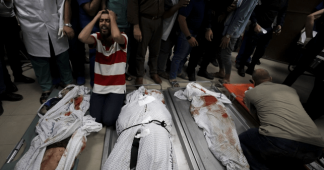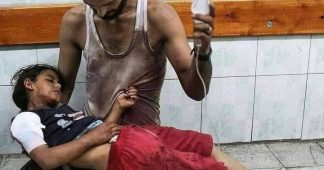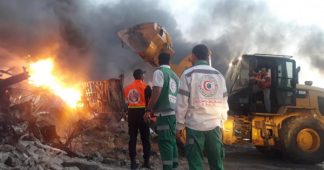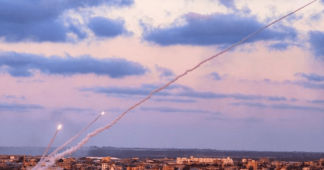MEE photojournalist Mohammed al-Hajjar and family have been displaced by Israeli air strikes three times in a week. From a Gaza refugee camp, he describes the scenes
By Mohammed al-Hajjar
in Nuseirat camp, occupied Palestine
15 October 2023
Mohammed al-Hajjar is a freelance photojournalist and longtime contributor to Middle East Eye. He, his wife and three children live in Gaza City, but they have now been displaced three times after one home they were staying in was bombed. From temporary shelter in southern Gaza, Mohammed describes the difficulties he and thousands of other Palestinians are living through:
Thank God me and my family are OK. But there’s no phone signal most of the time. I have been able to communicate with my colleague Maha Hussaini through text messages, and thankfully she and her family are OK too.
May God ease our difficulties and bring us relief. The situation is very tough here in the Nuseirat camp, a refugee camp 5km from Deir al-Balah populated by Palestinians mostly displaced from Beersheba in 1948.
There’s no food, drinking water, electricity, or anything. Israel has the Gaza Strip under complete siege and has cut off our supplies of everything from the outside world.
We have a little food and we’re trying to make it last.
We’re suffering. It’s pure suffering. Together, we are 26 displaced families in a building that’s meant for five families. More than 180 people are here, mostly women and children.
Israel told everyone living in northern Gaza, which includes all of Gaza City and more than a million people, to flee south if they wanted to live. Even before the warning, the UN said 400,000 Palestinians had been displaced by the bombing.
There’s a severe shortage of drinking water. All these people I’m in a building with share 200 litres a day, not enough to drink let alone use for other purposes. To save water, we’re careful even when using the toilet.
As for bread, the bakery gives us five bundles, about 150 pieces altogether, which isn’t enough for a meal each. We try to ration it throughout the day. None of us has have had a meal more substantive than a cheese sandwich.
Heavy Israeli air strikes rain down all the time. More than 2,300 Palestinians have been killed in Israeli bombing since last weekend’s Palestinian attack, which killed around 1,300 Israelis.
It’s not safe outside, so we mostly stay indoors. But there’s no internet, so it’s very difficult to know what is going on around us. We just spend our time talking and praying. Those who are able to sleep do that as much as possible.
Everywhere in this area has been without electricity for five days. Most of our phones are dead. We try to conserve phone batteries for when we need them.
I walk to the house of an acquaintance in Nuseirat who has solar panels to charge my phone and those of my family.
At night, we rely on a light powered by batteries, which may run out in the coming days. It was one of the few things we brought with us when we fled our home.
After 5pm, it’s quiet. Everyone tries to stay indoors. But the street is also full of displaced people like us, like us looking for shelter. Hundreds of families are on a street that can hardly accommodate 20.
The children feel bored and restless. They want to play and live their childhood despite the anxiety and tension surrounding us, but the conditions don’t allow it. Most of the time, the children complain, cry, and bother their mothers.
They also want things like juice, chocolate, crisps and sweets, but nothing like that is available in the local stores anymore. They are completely empty.
And not just that, most children have fallen ill, not helped by clouds of dust, dirt and smoke rising from the bombings.
We don’t have any medicine or treatments for them. Even the pharmacies lack basic medications, treatments for throat and lung inflammations, headaches, colds, pains and the flu.
We’ve divided ourselves, with women in one place and men in another, to respect privacy in this difficult time. Both places are very crowded. We sleep packed closely to each other, on the ground, anywhere. There are no covers to shield us from the cold that comes in the late night and early morning hours.
We try as much as possible to reassure each other that we’ll soon return to our homes, and that this war will end soon. But we don’t know if this is true or just hope. There’s fear that the crisis might drag on or we return to find our home uninhabitable.
Despite the relative calm in the Nuseirat camp, there’s bombing during the day and night in nearby areas.
The building we’re sheltered in is typical of a Palestinian refugee camp – irregular with breeze-block walls and thin metal sheets as a roof. That makes us worried about shrapnel falling on and our children and hurting them.
During the bombings, the metal sheets make terrifying noises, causing women and children to scream and wake from their sleep.
This is our experience from two days of displacement, and we don’t know if there are any prospects for solving this crisis or what awaits us in the coming days.
This article is available in French on Middle East Eye French edition.
We remind our readers that publication of articles on our site does not mean that we agree with what is written. Our policy is to publish anything which we consider of interest, so as to assist our readers in forming their opinions. Sometimes we even publish articles with which we totally disagree, since we believe it is important for our readers to be informed on as wide a spectrum of views as possible.











